Report: Legislation and Ethics in the Travel and Tourism Sector
VerifiedAdded on 2020/10/04
|12
|3730
|483
Report
AI Summary
This report delves into the legal and ethical landscape of the travel and tourism sector, focusing on the regulatory and legal framework in the UK, including surface, air, and sea transport laws. It examines the impact of health and safety principles on security legislation and equality. The report further analyzes contract and consumer protection legislation within the context of travel and tourism, highlighting the rights and responsibilities of both businesses and consumers. It also addresses ethical dilemmas and corporate social responsibility within the industry, providing a comprehensive overview of the key considerations for businesses operating in this sector. The report covers various aspects such as the British Travel agents association, Strategic rail authority, Air travel Organiser’s Licensing (ATOL), ABTA, Health and Safety Commission, International Air Transport Association, The Road and Air Act of 1979, The convention of Athens, Health and safety at work act of 1974, Occupier’s liability act of year 1984, Sex discrimination act of 1975, employment protection act of 1978, disability discrimination Act, 1955, Race Relations Act of 1976 and consumer law 1990.
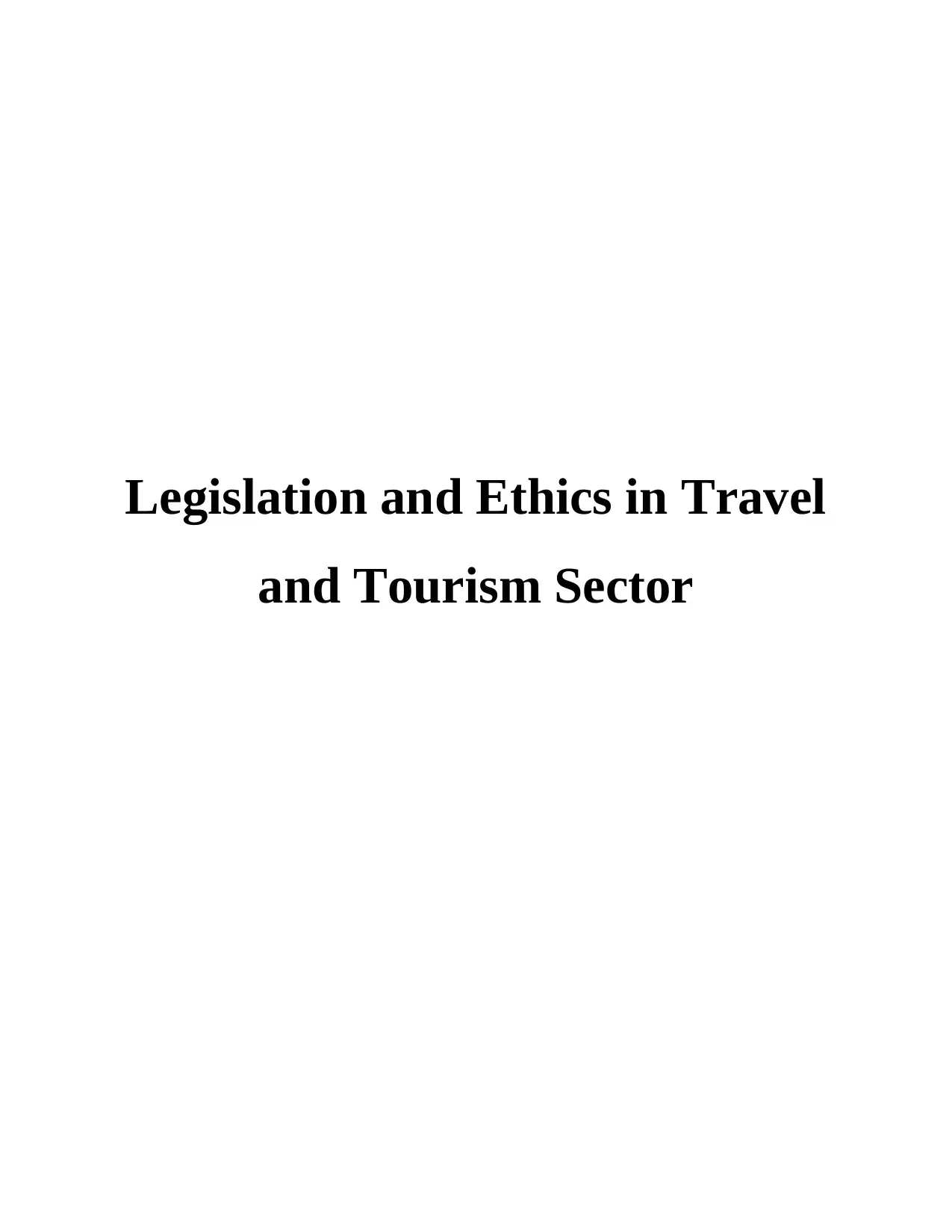
Legislation and Ethics in Travel
and Tourism Sector
and Tourism Sector
Paraphrase This Document
Need a fresh take? Get an instant paraphrase of this document with our AI Paraphraser
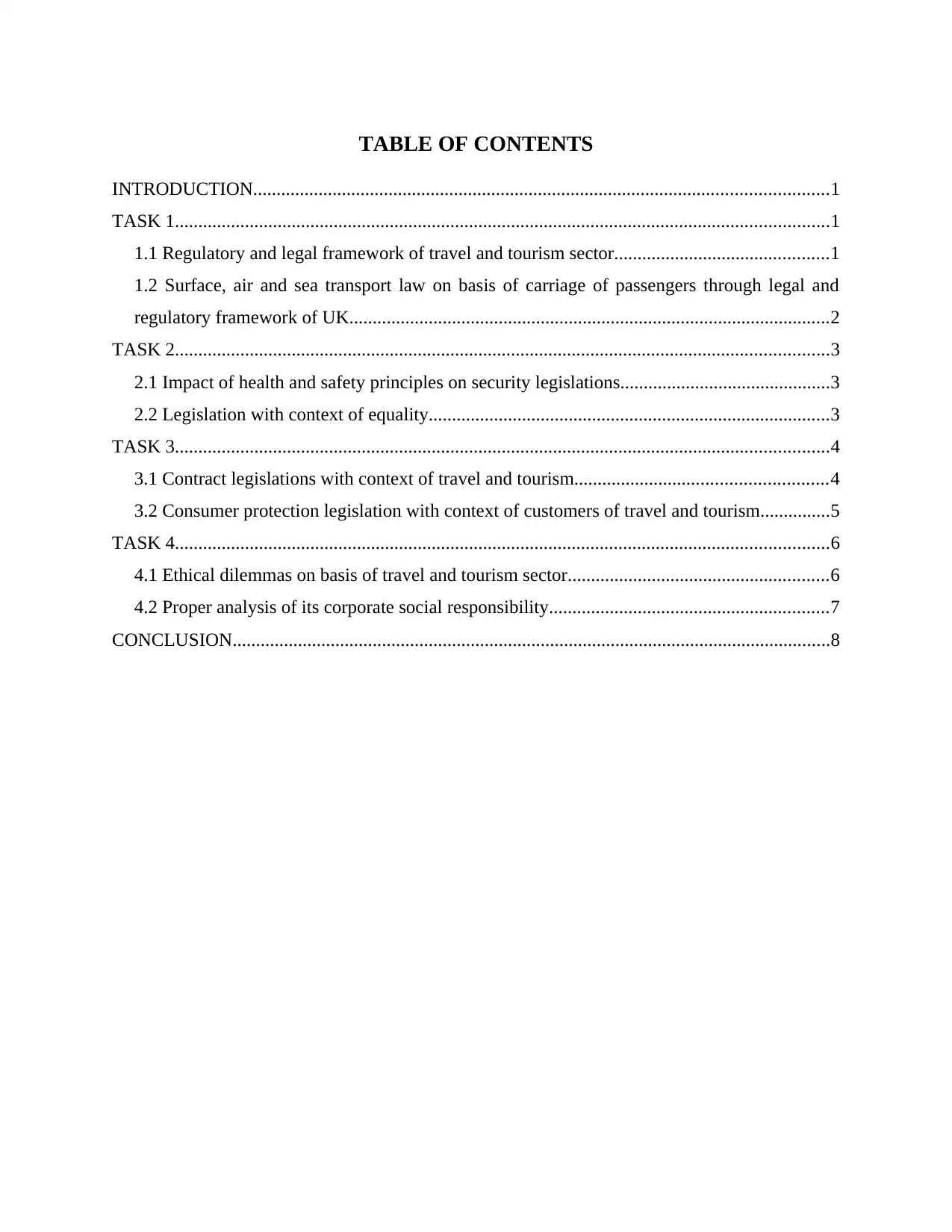
TABLE OF CONTENTS
INTRODUCTION...........................................................................................................................1
TASK 1............................................................................................................................................1
1.1 Regulatory and legal framework of travel and tourism sector..............................................1
1.2 Surface, air and sea transport law on basis of carriage of passengers through legal and
regulatory framework of UK.......................................................................................................2
TASK 2............................................................................................................................................3
2.1 Impact of health and safety principles on security legislations.............................................3
2.2 Legislation with context of equality......................................................................................3
TASK 3............................................................................................................................................4
3.1 Contract legislations with context of travel and tourism......................................................4
3.2 Consumer protection legislation with context of customers of travel and tourism...............5
TASK 4............................................................................................................................................6
4.1 Ethical dilemmas on basis of travel and tourism sector........................................................6
4.2 Proper analysis of its corporate social responsibility............................................................7
CONCLUSION................................................................................................................................8
INTRODUCTION...........................................................................................................................1
TASK 1............................................................................................................................................1
1.1 Regulatory and legal framework of travel and tourism sector..............................................1
1.2 Surface, air and sea transport law on basis of carriage of passengers through legal and
regulatory framework of UK.......................................................................................................2
TASK 2............................................................................................................................................3
2.1 Impact of health and safety principles on security legislations.............................................3
2.2 Legislation with context of equality......................................................................................3
TASK 3............................................................................................................................................4
3.1 Contract legislations with context of travel and tourism......................................................4
3.2 Consumer protection legislation with context of customers of travel and tourism...............5
TASK 4............................................................................................................................................6
4.1 Ethical dilemmas on basis of travel and tourism sector........................................................6
4.2 Proper analysis of its corporate social responsibility............................................................7
CONCLUSION................................................................................................................................8
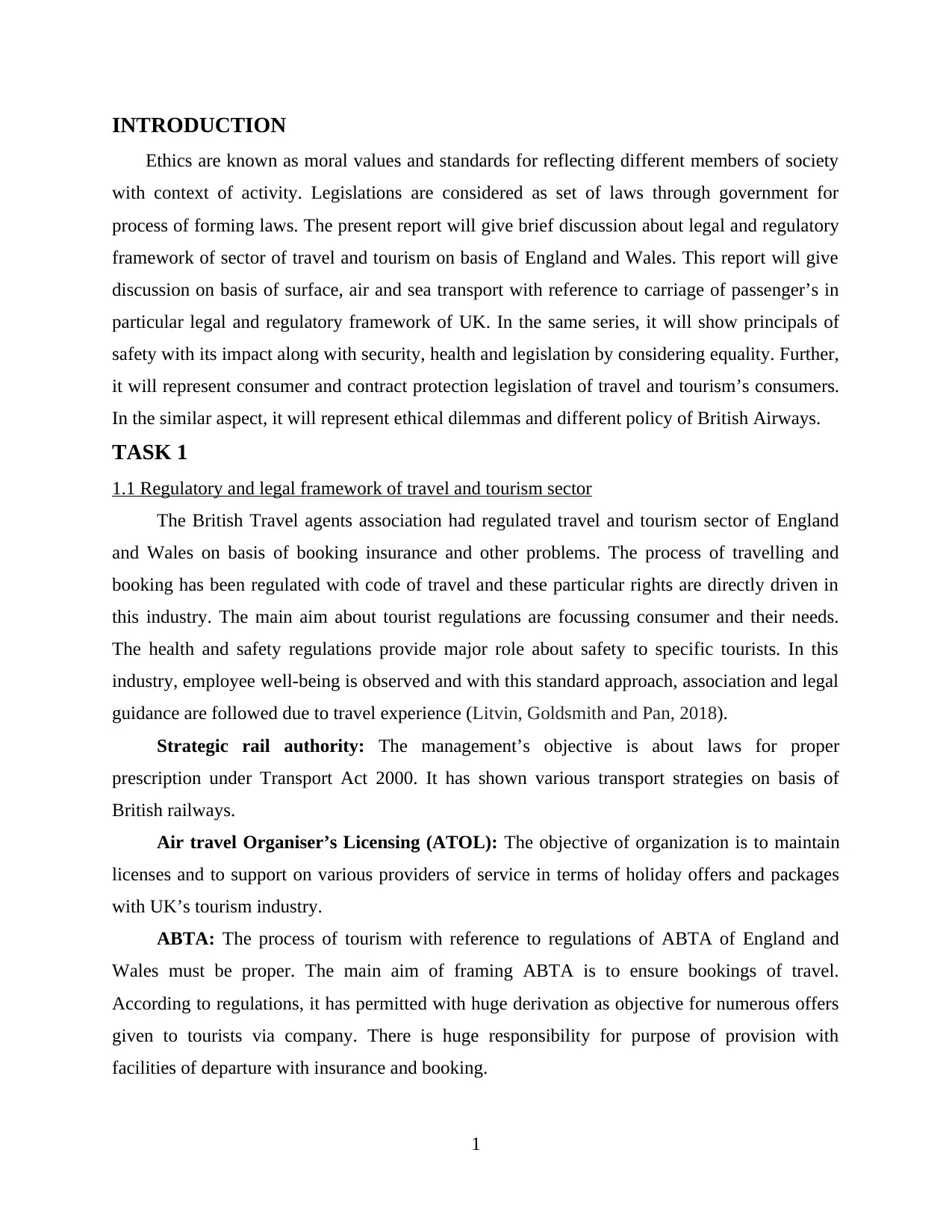
INTRODUCTION
Ethics are known as moral values and standards for reflecting different members of society
with context of activity. Legislations are considered as set of laws through government for
process of forming laws. The present report will give brief discussion about legal and regulatory
framework of sector of travel and tourism on basis of England and Wales. This report will give
discussion on basis of surface, air and sea transport with reference to carriage of passenger’s in
particular legal and regulatory framework of UK. In the same series, it will show principals of
safety with its impact along with security, health and legislation by considering equality. Further,
it will represent consumer and contract protection legislation of travel and tourism’s consumers.
In the similar aspect, it will represent ethical dilemmas and different policy of British Airways.
TASK 1
1.1 Regulatory and legal framework of travel and tourism sector
The British Travel agents association had regulated travel and tourism sector of England
and Wales on basis of booking insurance and other problems. The process of travelling and
booking has been regulated with code of travel and these particular rights are directly driven in
this industry. The main aim about tourist regulations are focussing consumer and their needs.
The health and safety regulations provide major role about safety to specific tourists. In this
industry, employee well-being is observed and with this standard approach, association and legal
guidance are followed due to travel experience (Litvin, Goldsmith and Pan, 2018).
Strategic rail authority: The management’s objective is about laws for proper
prescription under Transport Act 2000. It has shown various transport strategies on basis of
British railways.
Air travel Organiser’s Licensing (ATOL): The objective of organization is to maintain
licenses and to support on various providers of service in terms of holiday offers and packages
with UK’s tourism industry.
ABTA: The process of tourism with reference to regulations of ABTA of England and
Wales must be proper. The main aim of framing ABTA is to ensure bookings of travel.
According to regulations, it has permitted with huge derivation as objective for numerous offers
given to tourists via company. There is huge responsibility for purpose of provision with
facilities of departure with insurance and booking.
1
Ethics are known as moral values and standards for reflecting different members of society
with context of activity. Legislations are considered as set of laws through government for
process of forming laws. The present report will give brief discussion about legal and regulatory
framework of sector of travel and tourism on basis of England and Wales. This report will give
discussion on basis of surface, air and sea transport with reference to carriage of passenger’s in
particular legal and regulatory framework of UK. In the same series, it will show principals of
safety with its impact along with security, health and legislation by considering equality. Further,
it will represent consumer and contract protection legislation of travel and tourism’s consumers.
In the similar aspect, it will represent ethical dilemmas and different policy of British Airways.
TASK 1
1.1 Regulatory and legal framework of travel and tourism sector
The British Travel agents association had regulated travel and tourism sector of England
and Wales on basis of booking insurance and other problems. The process of travelling and
booking has been regulated with code of travel and these particular rights are directly driven in
this industry. The main aim about tourist regulations are focussing consumer and their needs.
The health and safety regulations provide major role about safety to specific tourists. In this
industry, employee well-being is observed and with this standard approach, association and legal
guidance are followed due to travel experience (Litvin, Goldsmith and Pan, 2018).
Strategic rail authority: The management’s objective is about laws for proper
prescription under Transport Act 2000. It has shown various transport strategies on basis of
British railways.
Air travel Organiser’s Licensing (ATOL): The objective of organization is to maintain
licenses and to support on various providers of service in terms of holiday offers and packages
with UK’s tourism industry.
ABTA: The process of tourism with reference to regulations of ABTA of England and
Wales must be proper. The main aim of framing ABTA is to ensure bookings of travel.
According to regulations, it has permitted with huge derivation as objective for numerous offers
given to tourists via company. There is huge responsibility for purpose of provision with
facilities of departure with insurance and booking.
1
⊘ This is a preview!⊘
Do you want full access?
Subscribe today to unlock all pages.

Trusted by 1+ million students worldwide
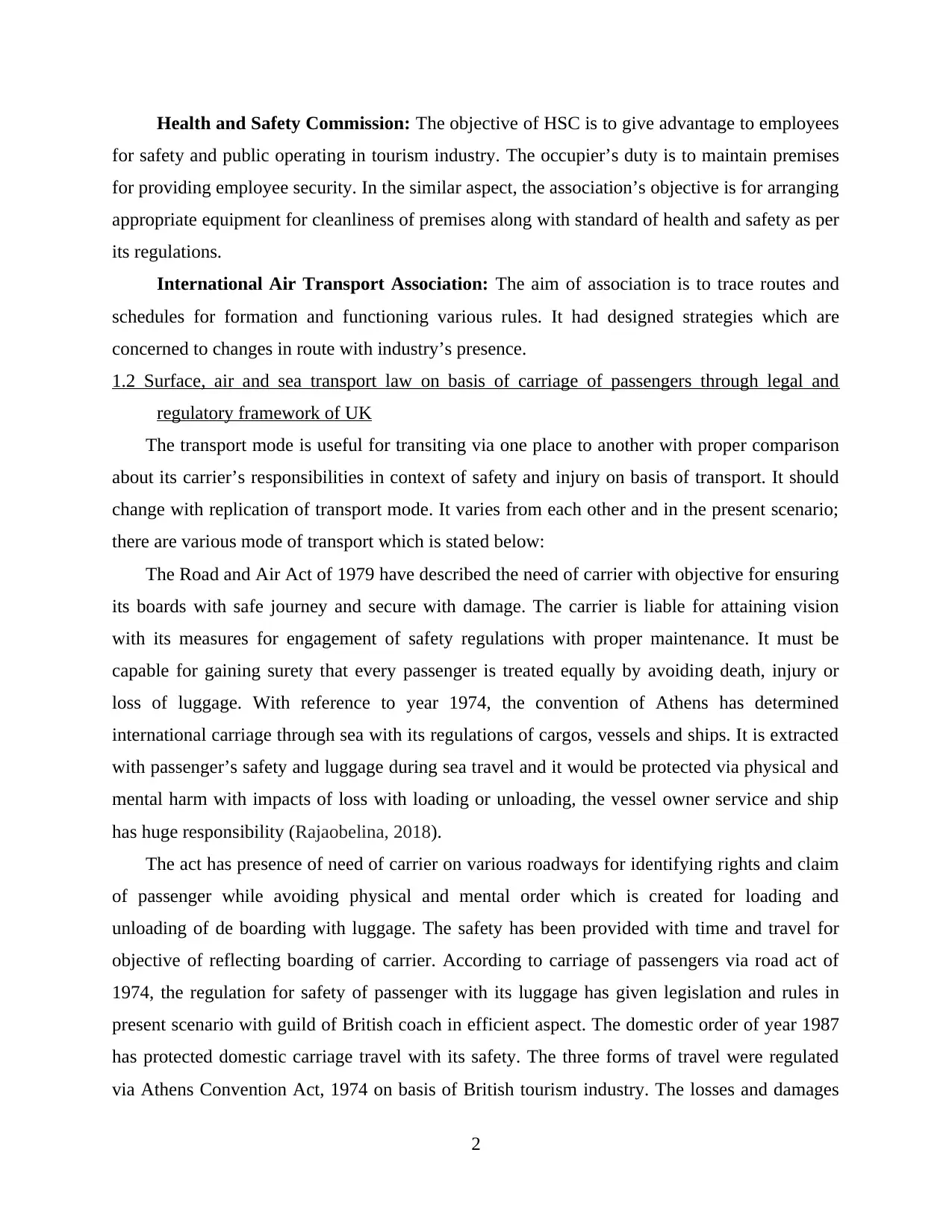
Health and Safety Commission: The objective of HSC is to give advantage to employees
for safety and public operating in tourism industry. The occupier’s duty is to maintain premises
for providing employee security. In the similar aspect, the association’s objective is for arranging
appropriate equipment for cleanliness of premises along with standard of health and safety as per
its regulations.
International Air Transport Association: The aim of association is to trace routes and
schedules for formation and functioning various rules. It had designed strategies which are
concerned to changes in route with industry’s presence.
1.2 Surface, air and sea transport law on basis of carriage of passengers through legal and
regulatory framework of UK
The transport mode is useful for transiting via one place to another with proper comparison
about its carrier’s responsibilities in context of safety and injury on basis of transport. It should
change with replication of transport mode. It varies from each other and in the present scenario;
there are various mode of transport which is stated below:
The Road and Air Act of 1979 have described the need of carrier with objective for ensuring
its boards with safe journey and secure with damage. The carrier is liable for attaining vision
with its measures for engagement of safety regulations with proper maintenance. It must be
capable for gaining surety that every passenger is treated equally by avoiding death, injury or
loss of luggage. With reference to year 1974, the convention of Athens has determined
international carriage through sea with its regulations of cargos, vessels and ships. It is extracted
with passenger’s safety and luggage during sea travel and it would be protected via physical and
mental harm with impacts of loss with loading or unloading, the vessel owner service and ship
has huge responsibility (Rajaobelina, 2018).
The act has presence of need of carrier on various roadways for identifying rights and claim
of passenger while avoiding physical and mental order which is created for loading and
unloading of de boarding with luggage. The safety has been provided with time and travel for
objective of reflecting boarding of carrier. According to carriage of passengers via road act of
1974, the regulation for safety of passenger with its luggage has given legislation and rules in
present scenario with guild of British coach in efficient aspect. The domestic order of year 1987
has protected domestic carriage travel with its safety. The three forms of travel were regulated
via Athens Convention Act, 1974 on basis of British tourism industry. The losses and damages
2
for safety and public operating in tourism industry. The occupier’s duty is to maintain premises
for providing employee security. In the similar aspect, the association’s objective is for arranging
appropriate equipment for cleanliness of premises along with standard of health and safety as per
its regulations.
International Air Transport Association: The aim of association is to trace routes and
schedules for formation and functioning various rules. It had designed strategies which are
concerned to changes in route with industry’s presence.
1.2 Surface, air and sea transport law on basis of carriage of passengers through legal and
regulatory framework of UK
The transport mode is useful for transiting via one place to another with proper comparison
about its carrier’s responsibilities in context of safety and injury on basis of transport. It should
change with replication of transport mode. It varies from each other and in the present scenario;
there are various mode of transport which is stated below:
The Road and Air Act of 1979 have described the need of carrier with objective for ensuring
its boards with safe journey and secure with damage. The carrier is liable for attaining vision
with its measures for engagement of safety regulations with proper maintenance. It must be
capable for gaining surety that every passenger is treated equally by avoiding death, injury or
loss of luggage. With reference to year 1974, the convention of Athens has determined
international carriage through sea with its regulations of cargos, vessels and ships. It is extracted
with passenger’s safety and luggage during sea travel and it would be protected via physical and
mental harm with impacts of loss with loading or unloading, the vessel owner service and ship
has huge responsibility (Rajaobelina, 2018).
The act has presence of need of carrier on various roadways for identifying rights and claim
of passenger while avoiding physical and mental order which is created for loading and
unloading of de boarding with luggage. The safety has been provided with time and travel for
objective of reflecting boarding of carrier. According to carriage of passengers via road act of
1974, the regulation for safety of passenger with its luggage has given legislation and rules in
present scenario with guild of British coach in efficient aspect. The domestic order of year 1987
has protected domestic carriage travel with its safety. The three forms of travel were regulated
via Athens Convention Act, 1974 on basis of British tourism industry. The losses and damages
2
Paraphrase This Document
Need a fresh take? Get an instant paraphrase of this document with our AI Paraphraser
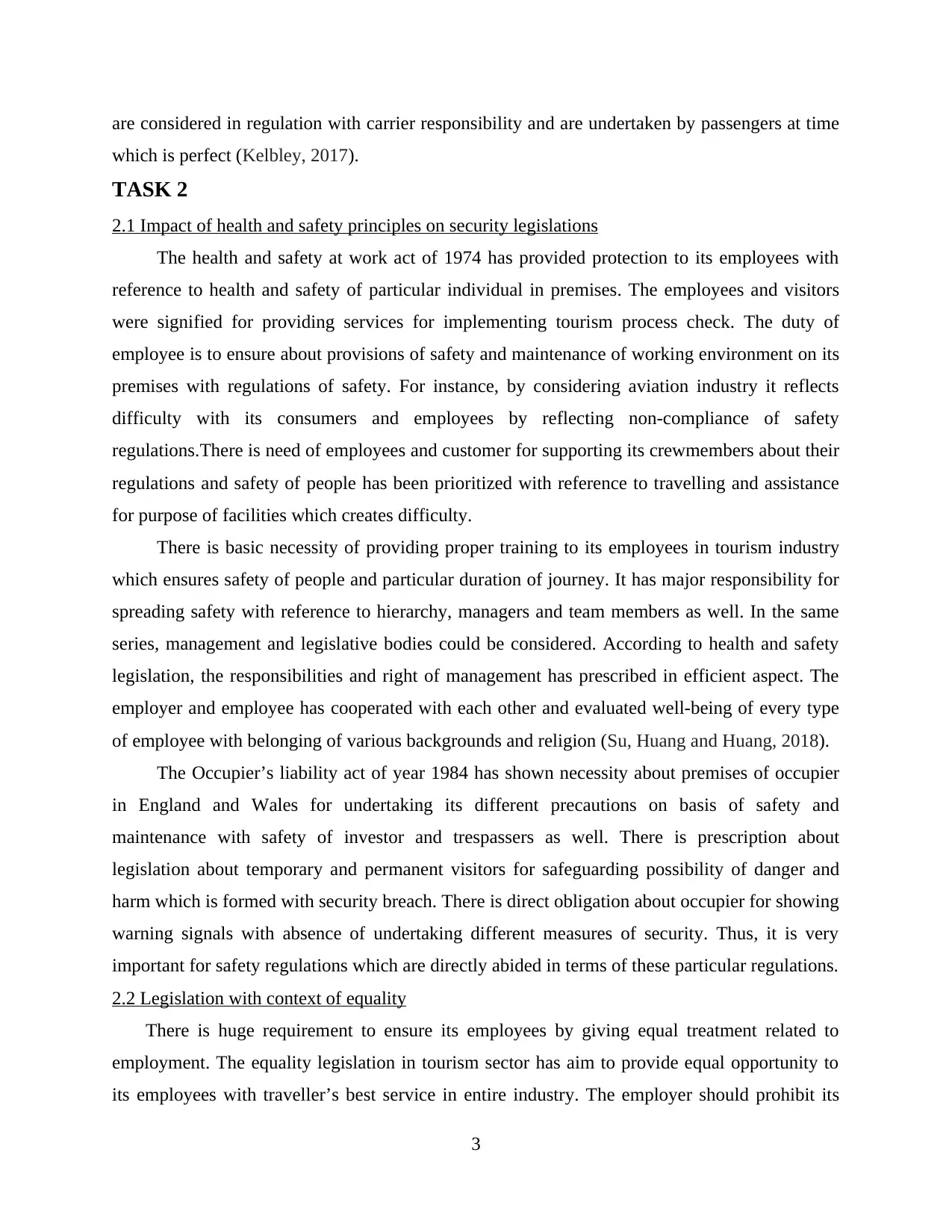
are considered in regulation with carrier responsibility and are undertaken by passengers at time
which is perfect (Kelbley, 2017).
TASK 2
2.1 Impact of health and safety principles on security legislations
The health and safety at work act of 1974 has provided protection to its employees with
reference to health and safety of particular individual in premises. The employees and visitors
were signified for providing services for implementing tourism process check. The duty of
employee is to ensure about provisions of safety and maintenance of working environment on its
premises with regulations of safety. For instance, by considering aviation industry it reflects
difficulty with its consumers and employees by reflecting non-compliance of safety
regulations.There is need of employees and customer for supporting its crewmembers about their
regulations and safety of people has been prioritized with reference to travelling and assistance
for purpose of facilities which creates difficulty.
There is basic necessity of providing proper training to its employees in tourism industry
which ensures safety of people and particular duration of journey. It has major responsibility for
spreading safety with reference to hierarchy, managers and team members as well. In the same
series, management and legislative bodies could be considered. According to health and safety
legislation, the responsibilities and right of management has prescribed in efficient aspect. The
employer and employee has cooperated with each other and evaluated well-being of every type
of employee with belonging of various backgrounds and religion (Su, Huang and Huang, 2018).
The Occupier’s liability act of year 1984 has shown necessity about premises of occupier
in England and Wales for undertaking its different precautions on basis of safety and
maintenance with safety of investor and trespassers as well. There is prescription about
legislation about temporary and permanent visitors for safeguarding possibility of danger and
harm which is formed with security breach. There is direct obligation about occupier for showing
warning signals with absence of undertaking different measures of security. Thus, it is very
important for safety regulations which are directly abided in terms of these particular regulations.
2.2 Legislation with context of equality
There is huge requirement to ensure its employees by giving equal treatment related to
employment. The equality legislation in tourism sector has aim to provide equal opportunity to
its employees with traveller’s best service in entire industry. The employer should prohibit its
3
which is perfect (Kelbley, 2017).
TASK 2
2.1 Impact of health and safety principles on security legislations
The health and safety at work act of 1974 has provided protection to its employees with
reference to health and safety of particular individual in premises. The employees and visitors
were signified for providing services for implementing tourism process check. The duty of
employee is to ensure about provisions of safety and maintenance of working environment on its
premises with regulations of safety. For instance, by considering aviation industry it reflects
difficulty with its consumers and employees by reflecting non-compliance of safety
regulations.There is need of employees and customer for supporting its crewmembers about their
regulations and safety of people has been prioritized with reference to travelling and assistance
for purpose of facilities which creates difficulty.
There is basic necessity of providing proper training to its employees in tourism industry
which ensures safety of people and particular duration of journey. It has major responsibility for
spreading safety with reference to hierarchy, managers and team members as well. In the same
series, management and legislative bodies could be considered. According to health and safety
legislation, the responsibilities and right of management has prescribed in efficient aspect. The
employer and employee has cooperated with each other and evaluated well-being of every type
of employee with belonging of various backgrounds and religion (Su, Huang and Huang, 2018).
The Occupier’s liability act of year 1984 has shown necessity about premises of occupier
in England and Wales for undertaking its different precautions on basis of safety and
maintenance with safety of investor and trespassers as well. There is prescription about
legislation about temporary and permanent visitors for safeguarding possibility of danger and
harm which is formed with security breach. There is direct obligation about occupier for showing
warning signals with absence of undertaking different measures of security. Thus, it is very
important for safety regulations which are directly abided in terms of these particular regulations.
2.2 Legislation with context of equality
There is huge requirement to ensure its employees by giving equal treatment related to
employment. The equality legislation in tourism sector has aim to provide equal opportunity to
its employees with traveller’s best service in entire industry. The employer should prohibit its
3
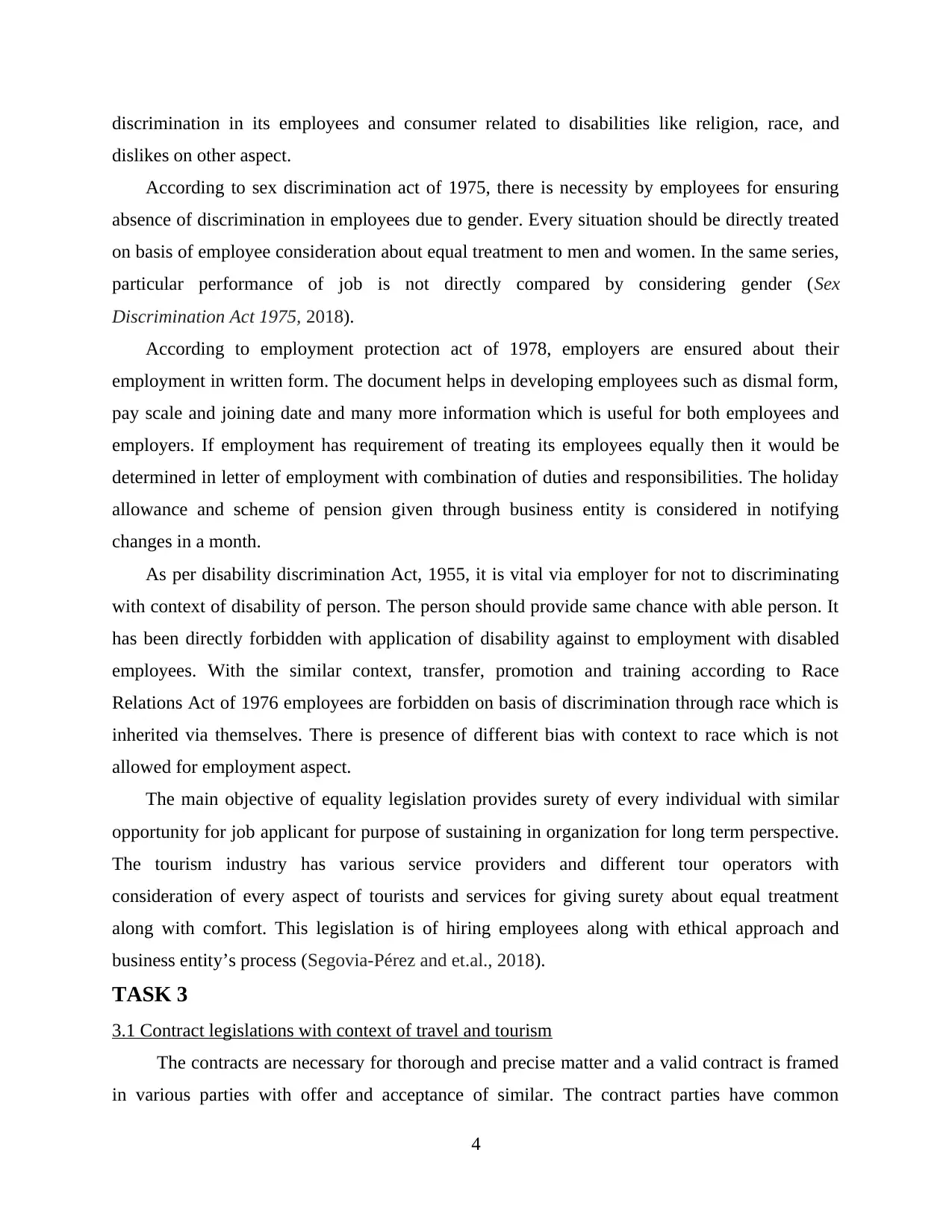
discrimination in its employees and consumer related to disabilities like religion, race, and
dislikes on other aspect.
According to sex discrimination act of 1975, there is necessity by employees for ensuring
absence of discrimination in employees due to gender. Every situation should be directly treated
on basis of employee consideration about equal treatment to men and women. In the same series,
particular performance of job is not directly compared by considering gender (Sex
Discrimination Act 1975, 2018).
According to employment protection act of 1978, employers are ensured about their
employment in written form. The document helps in developing employees such as dismal form,
pay scale and joining date and many more information which is useful for both employees and
employers. If employment has requirement of treating its employees equally then it would be
determined in letter of employment with combination of duties and responsibilities. The holiday
allowance and scheme of pension given through business entity is considered in notifying
changes in a month.
As per disability discrimination Act, 1955, it is vital via employer for not to discriminating
with context of disability of person. The person should provide same chance with able person. It
has been directly forbidden with application of disability against to employment with disabled
employees. With the similar context, transfer, promotion and training according to Race
Relations Act of 1976 employees are forbidden on basis of discrimination through race which is
inherited via themselves. There is presence of different bias with context to race which is not
allowed for employment aspect.
The main objective of equality legislation provides surety of every individual with similar
opportunity for job applicant for purpose of sustaining in organization for long term perspective.
The tourism industry has various service providers and different tour operators with
consideration of every aspect of tourists and services for giving surety about equal treatment
along with comfort. This legislation is of hiring employees along with ethical approach and
business entity’s process (Segovia-Pérez and et.al., 2018).
TASK 3
3.1 Contract legislations with context of travel and tourism
The contracts are necessary for thorough and precise matter and a valid contract is framed
in various parties with offer and acceptance of similar. The contract parties have common
4
dislikes on other aspect.
According to sex discrimination act of 1975, there is necessity by employees for ensuring
absence of discrimination in employees due to gender. Every situation should be directly treated
on basis of employee consideration about equal treatment to men and women. In the same series,
particular performance of job is not directly compared by considering gender (Sex
Discrimination Act 1975, 2018).
According to employment protection act of 1978, employers are ensured about their
employment in written form. The document helps in developing employees such as dismal form,
pay scale and joining date and many more information which is useful for both employees and
employers. If employment has requirement of treating its employees equally then it would be
determined in letter of employment with combination of duties and responsibilities. The holiday
allowance and scheme of pension given through business entity is considered in notifying
changes in a month.
As per disability discrimination Act, 1955, it is vital via employer for not to discriminating
with context of disability of person. The person should provide same chance with able person. It
has been directly forbidden with application of disability against to employment with disabled
employees. With the similar context, transfer, promotion and training according to Race
Relations Act of 1976 employees are forbidden on basis of discrimination through race which is
inherited via themselves. There is presence of different bias with context to race which is not
allowed for employment aspect.
The main objective of equality legislation provides surety of every individual with similar
opportunity for job applicant for purpose of sustaining in organization for long term perspective.
The tourism industry has various service providers and different tour operators with
consideration of every aspect of tourists and services for giving surety about equal treatment
along with comfort. This legislation is of hiring employees along with ethical approach and
business entity’s process (Segovia-Pérez and et.al., 2018).
TASK 3
3.1 Contract legislations with context of travel and tourism
The contracts are necessary for thorough and precise matter and a valid contract is framed
in various parties with offer and acceptance of similar. The contract parties have common
4
⊘ This is a preview!⊘
Do you want full access?
Subscribe today to unlock all pages.

Trusted by 1+ million students worldwide
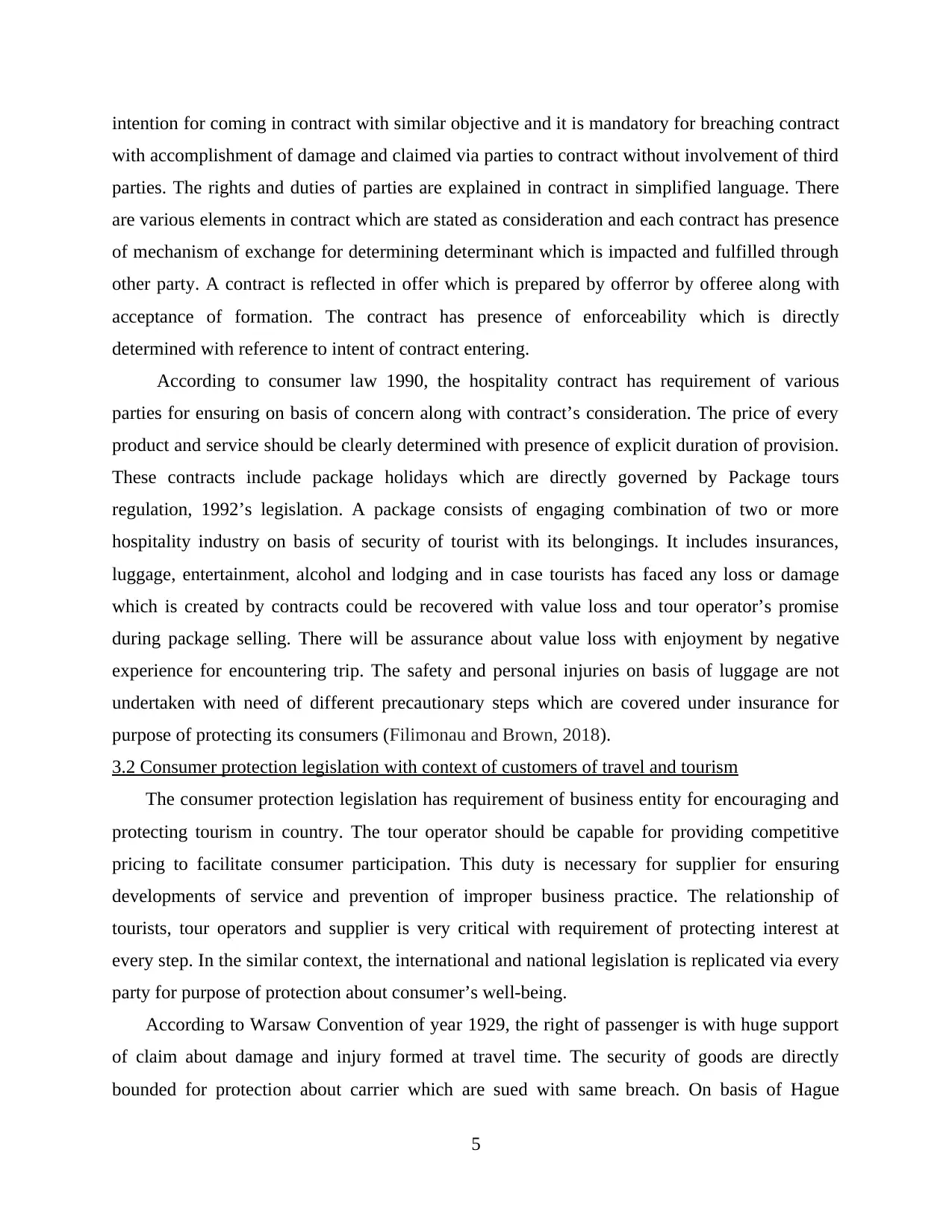
intention for coming in contract with similar objective and it is mandatory for breaching contract
with accomplishment of damage and claimed via parties to contract without involvement of third
parties. The rights and duties of parties are explained in contract in simplified language. There
are various elements in contract which are stated as consideration and each contract has presence
of mechanism of exchange for determining determinant which is impacted and fulfilled through
other party. A contract is reflected in offer which is prepared by offerror by offeree along with
acceptance of formation. The contract has presence of enforceability which is directly
determined with reference to intent of contract entering.
According to consumer law 1990, the hospitality contract has requirement of various
parties for ensuring on basis of concern along with contract’s consideration. The price of every
product and service should be clearly determined with presence of explicit duration of provision.
These contracts include package holidays which are directly governed by Package tours
regulation, 1992’s legislation. A package consists of engaging combination of two or more
hospitality industry on basis of security of tourist with its belongings. It includes insurances,
luggage, entertainment, alcohol and lodging and in case tourists has faced any loss or damage
which is created by contracts could be recovered with value loss and tour operator’s promise
during package selling. There will be assurance about value loss with enjoyment by negative
experience for encountering trip. The safety and personal injuries on basis of luggage are not
undertaken with need of different precautionary steps which are covered under insurance for
purpose of protecting its consumers (Filimonau and Brown, 2018).
3.2 Consumer protection legislation with context of customers of travel and tourism
The consumer protection legislation has requirement of business entity for encouraging and
protecting tourism in country. The tour operator should be capable for providing competitive
pricing to facilitate consumer participation. This duty is necessary for supplier for ensuring
developments of service and prevention of improper business practice. The relationship of
tourists, tour operators and supplier is very critical with requirement of protecting interest at
every step. In the similar context, the international and national legislation is replicated via every
party for purpose of protection about consumer’s well-being.
According to Warsaw Convention of year 1929, the right of passenger is with huge support
of claim about damage and injury formed at travel time. The security of goods are directly
bounded for protection about carrier which are sued with same breach. On basis of Hague
5
with accomplishment of damage and claimed via parties to contract without involvement of third
parties. The rights and duties of parties are explained in contract in simplified language. There
are various elements in contract which are stated as consideration and each contract has presence
of mechanism of exchange for determining determinant which is impacted and fulfilled through
other party. A contract is reflected in offer which is prepared by offerror by offeree along with
acceptance of formation. The contract has presence of enforceability which is directly
determined with reference to intent of contract entering.
According to consumer law 1990, the hospitality contract has requirement of various
parties for ensuring on basis of concern along with contract’s consideration. The price of every
product and service should be clearly determined with presence of explicit duration of provision.
These contracts include package holidays which are directly governed by Package tours
regulation, 1992’s legislation. A package consists of engaging combination of two or more
hospitality industry on basis of security of tourist with its belongings. It includes insurances,
luggage, entertainment, alcohol and lodging and in case tourists has faced any loss or damage
which is created by contracts could be recovered with value loss and tour operator’s promise
during package selling. There will be assurance about value loss with enjoyment by negative
experience for encountering trip. The safety and personal injuries on basis of luggage are not
undertaken with need of different precautionary steps which are covered under insurance for
purpose of protecting its consumers (Filimonau and Brown, 2018).
3.2 Consumer protection legislation with context of customers of travel and tourism
The consumer protection legislation has requirement of business entity for encouraging and
protecting tourism in country. The tour operator should be capable for providing competitive
pricing to facilitate consumer participation. This duty is necessary for supplier for ensuring
developments of service and prevention of improper business practice. The relationship of
tourists, tour operators and supplier is very critical with requirement of protecting interest at
every step. In the similar context, the international and national legislation is replicated via every
party for purpose of protection about consumer’s well-being.
According to Warsaw Convention of year 1929, the right of passenger is with huge support
of claim about damage and injury formed at travel time. The security of goods are directly
bounded for protection about carrier which are sued with same breach. On basis of Hague
5
Paraphrase This Document
Need a fresh take? Get an instant paraphrase of this document with our AI Paraphraser
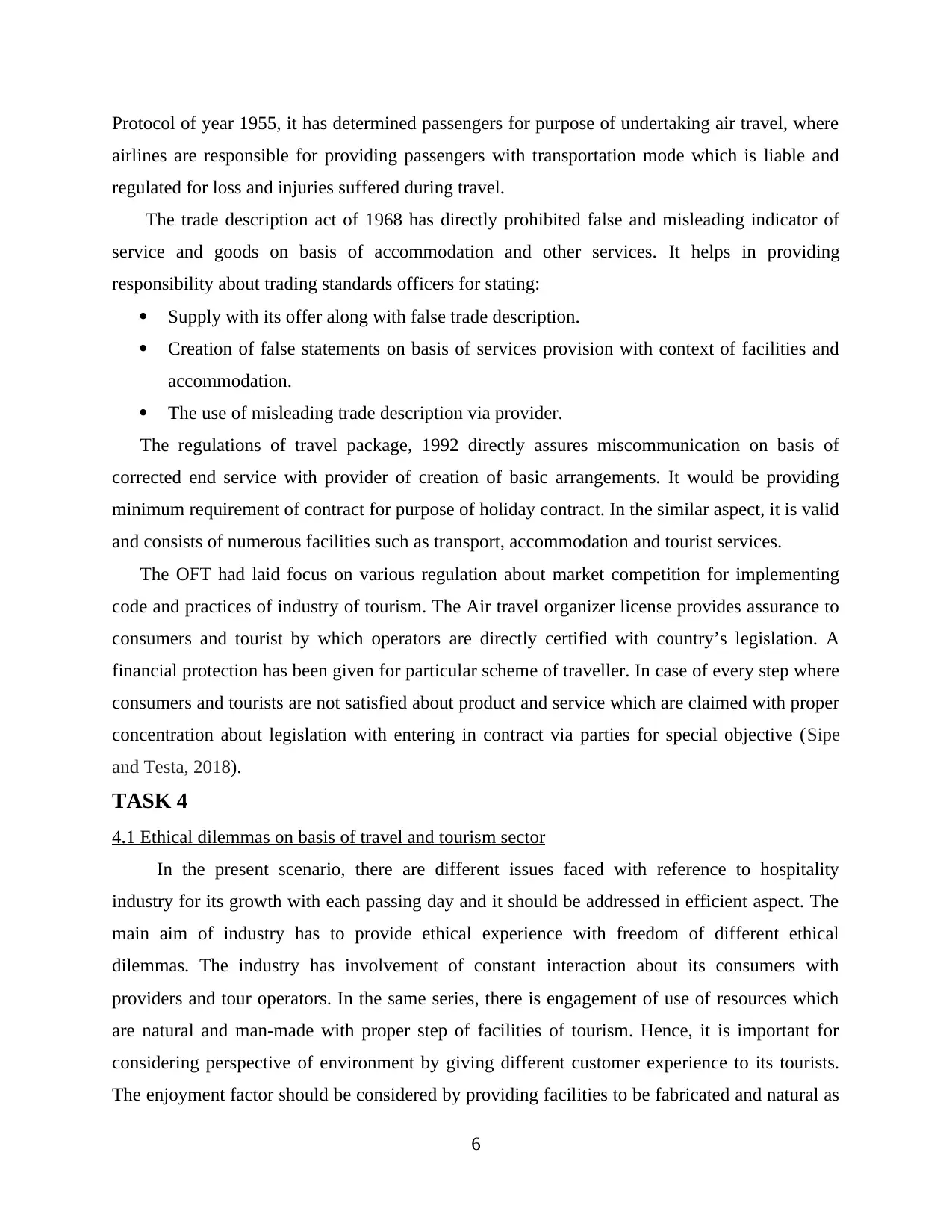
Protocol of year 1955, it has determined passengers for purpose of undertaking air travel, where
airlines are responsible for providing passengers with transportation mode which is liable and
regulated for loss and injuries suffered during travel.
The trade description act of 1968 has directly prohibited false and misleading indicator of
service and goods on basis of accommodation and other services. It helps in providing
responsibility about trading standards officers for stating:
Supply with its offer along with false trade description.
Creation of false statements on basis of services provision with context of facilities and
accommodation.
The use of misleading trade description via provider.
The regulations of travel package, 1992 directly assures miscommunication on basis of
corrected end service with provider of creation of basic arrangements. It would be providing
minimum requirement of contract for purpose of holiday contract. In the similar aspect, it is valid
and consists of numerous facilities such as transport, accommodation and tourist services.
The OFT had laid focus on various regulation about market competition for implementing
code and practices of industry of tourism. The Air travel organizer license provides assurance to
consumers and tourist by which operators are directly certified with country’s legislation. A
financial protection has been given for particular scheme of traveller. In case of every step where
consumers and tourists are not satisfied about product and service which are claimed with proper
concentration about legislation with entering in contract via parties for special objective (Sipe
and Testa, 2018).
TASK 4
4.1 Ethical dilemmas on basis of travel and tourism sector
In the present scenario, there are different issues faced with reference to hospitality
industry for its growth with each passing day and it should be addressed in efficient aspect. The
main aim of industry has to provide ethical experience with freedom of different ethical
dilemmas. The industry has involvement of constant interaction about its consumers with
providers and tour operators. In the same series, there is engagement of use of resources which
are natural and man-made with proper step of facilities of tourism. Hence, it is important for
considering perspective of environment by giving different customer experience to its tourists.
The enjoyment factor should be considered by providing facilities to be fabricated and natural as
6
airlines are responsible for providing passengers with transportation mode which is liable and
regulated for loss and injuries suffered during travel.
The trade description act of 1968 has directly prohibited false and misleading indicator of
service and goods on basis of accommodation and other services. It helps in providing
responsibility about trading standards officers for stating:
Supply with its offer along with false trade description.
Creation of false statements on basis of services provision with context of facilities and
accommodation.
The use of misleading trade description via provider.
The regulations of travel package, 1992 directly assures miscommunication on basis of
corrected end service with provider of creation of basic arrangements. It would be providing
minimum requirement of contract for purpose of holiday contract. In the similar aspect, it is valid
and consists of numerous facilities such as transport, accommodation and tourist services.
The OFT had laid focus on various regulation about market competition for implementing
code and practices of industry of tourism. The Air travel organizer license provides assurance to
consumers and tourist by which operators are directly certified with country’s legislation. A
financial protection has been given for particular scheme of traveller. In case of every step where
consumers and tourists are not satisfied about product and service which are claimed with proper
concentration about legislation with entering in contract via parties for special objective (Sipe
and Testa, 2018).
TASK 4
4.1 Ethical dilemmas on basis of travel and tourism sector
In the present scenario, there are different issues faced with reference to hospitality
industry for its growth with each passing day and it should be addressed in efficient aspect. The
main aim of industry has to provide ethical experience with freedom of different ethical
dilemmas. The industry has involvement of constant interaction about its consumers with
providers and tour operators. In the same series, there is engagement of use of resources which
are natural and man-made with proper step of facilities of tourism. Hence, it is important for
considering perspective of environment by giving different customer experience to its tourists.
The enjoyment factor should be considered by providing facilities to be fabricated and natural as
6
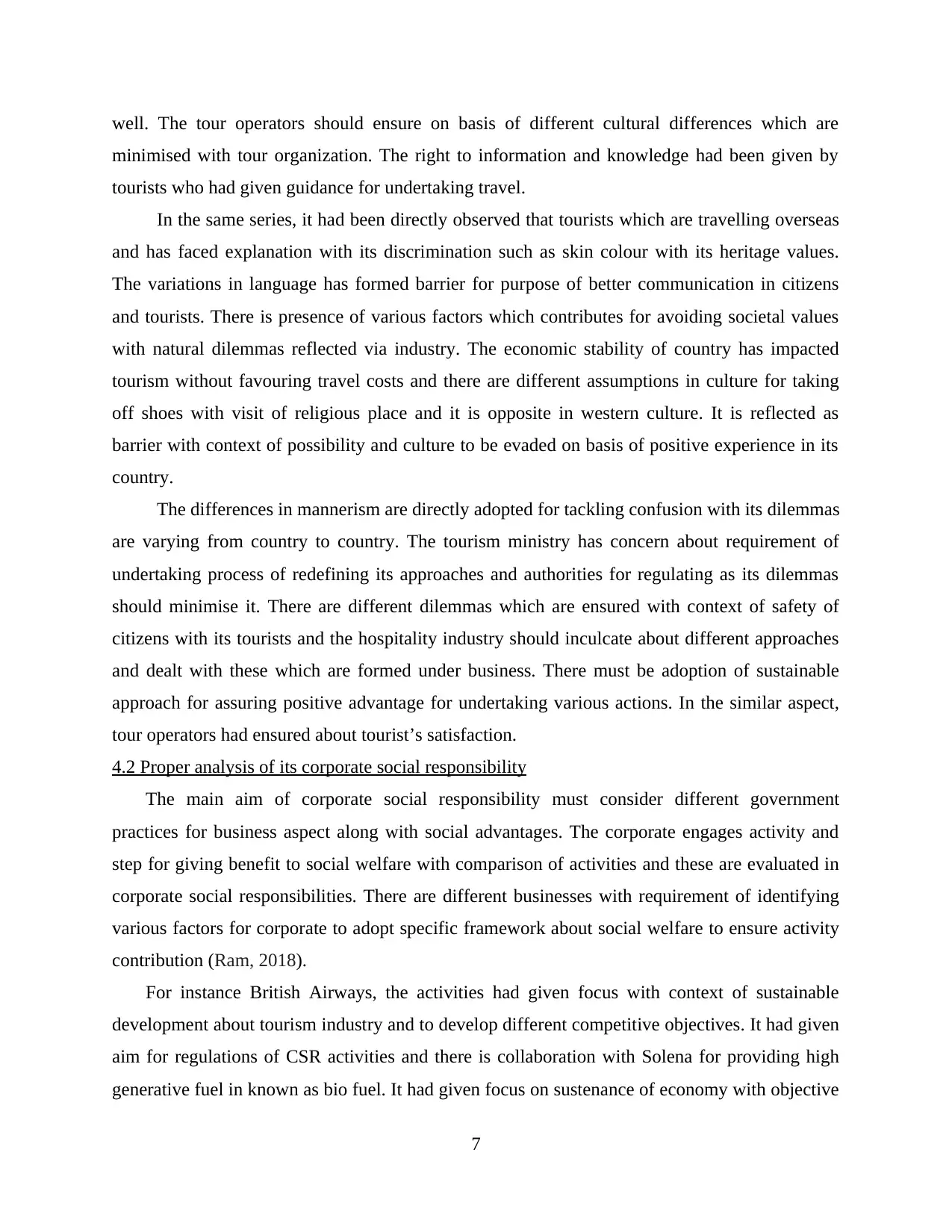
well. The tour operators should ensure on basis of different cultural differences which are
minimised with tour organization. The right to information and knowledge had been given by
tourists who had given guidance for undertaking travel.
In the same series, it had been directly observed that tourists which are travelling overseas
and has faced explanation with its discrimination such as skin colour with its heritage values.
The variations in language has formed barrier for purpose of better communication in citizens
and tourists. There is presence of various factors which contributes for avoiding societal values
with natural dilemmas reflected via industry. The economic stability of country has impacted
tourism without favouring travel costs and there are different assumptions in culture for taking
off shoes with visit of religious place and it is opposite in western culture. It is reflected as
barrier with context of possibility and culture to be evaded on basis of positive experience in its
country.
The differences in mannerism are directly adopted for tackling confusion with its dilemmas
are varying from country to country. The tourism ministry has concern about requirement of
undertaking process of redefining its approaches and authorities for regulating as its dilemmas
should minimise it. There are different dilemmas which are ensured with context of safety of
citizens with its tourists and the hospitality industry should inculcate about different approaches
and dealt with these which are formed under business. There must be adoption of sustainable
approach for assuring positive advantage for undertaking various actions. In the similar aspect,
tour operators had ensured about tourist’s satisfaction.
4.2 Proper analysis of its corporate social responsibility
The main aim of corporate social responsibility must consider different government
practices for business aspect along with social advantages. The corporate engages activity and
step for giving benefit to social welfare with comparison of activities and these are evaluated in
corporate social responsibilities. There are different businesses with requirement of identifying
various factors for corporate to adopt specific framework about social welfare to ensure activity
contribution (Ram, 2018).
For instance British Airways, the activities had given focus with context of sustainable
development about tourism industry and to develop different competitive objectives. It had given
aim for regulations of CSR activities and there is collaboration with Solena for providing high
generative fuel in known as bio fuel. It had given focus on sustenance of economy with objective
7
minimised with tour organization. The right to information and knowledge had been given by
tourists who had given guidance for undertaking travel.
In the same series, it had been directly observed that tourists which are travelling overseas
and has faced explanation with its discrimination such as skin colour with its heritage values.
The variations in language has formed barrier for purpose of better communication in citizens
and tourists. There is presence of various factors which contributes for avoiding societal values
with natural dilemmas reflected via industry. The economic stability of country has impacted
tourism without favouring travel costs and there are different assumptions in culture for taking
off shoes with visit of religious place and it is opposite in western culture. It is reflected as
barrier with context of possibility and culture to be evaded on basis of positive experience in its
country.
The differences in mannerism are directly adopted for tackling confusion with its dilemmas
are varying from country to country. The tourism ministry has concern about requirement of
undertaking process of redefining its approaches and authorities for regulating as its dilemmas
should minimise it. There are different dilemmas which are ensured with context of safety of
citizens with its tourists and the hospitality industry should inculcate about different approaches
and dealt with these which are formed under business. There must be adoption of sustainable
approach for assuring positive advantage for undertaking various actions. In the similar aspect,
tour operators had ensured about tourist’s satisfaction.
4.2 Proper analysis of its corporate social responsibility
The main aim of corporate social responsibility must consider different government
practices for business aspect along with social advantages. The corporate engages activity and
step for giving benefit to social welfare with comparison of activities and these are evaluated in
corporate social responsibilities. There are different businesses with requirement of identifying
various factors for corporate to adopt specific framework about social welfare to ensure activity
contribution (Ram, 2018).
For instance British Airways, the activities had given focus with context of sustainable
development about tourism industry and to develop different competitive objectives. It had given
aim for regulations of CSR activities and there is collaboration with Solena for providing high
generative fuel in known as bio fuel. It had given focus on sustenance of economy with objective
7
⊘ This is a preview!⊘
Do you want full access?
Subscribe today to unlock all pages.

Trusted by 1+ million students worldwide
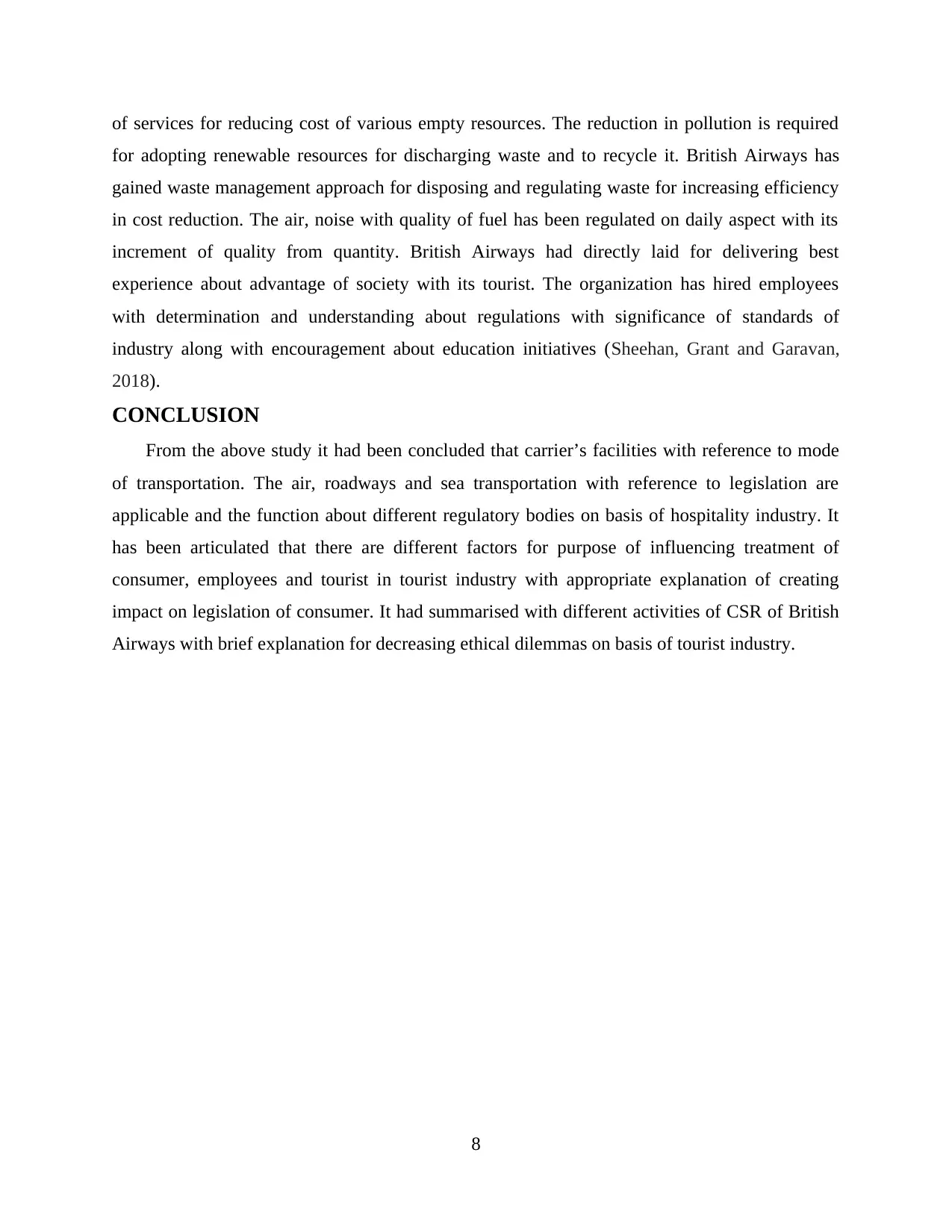
of services for reducing cost of various empty resources. The reduction in pollution is required
for adopting renewable resources for discharging waste and to recycle it. British Airways has
gained waste management approach for disposing and regulating waste for increasing efficiency
in cost reduction. The air, noise with quality of fuel has been regulated on daily aspect with its
increment of quality from quantity. British Airways had directly laid for delivering best
experience about advantage of society with its tourist. The organization has hired employees
with determination and understanding about regulations with significance of standards of
industry along with encouragement about education initiatives (Sheehan, Grant and Garavan,
2018).
CONCLUSION
From the above study it had been concluded that carrier’s facilities with reference to mode
of transportation. The air, roadways and sea transportation with reference to legislation are
applicable and the function about different regulatory bodies on basis of hospitality industry. It
has been articulated that there are different factors for purpose of influencing treatment of
consumer, employees and tourist in tourist industry with appropriate explanation of creating
impact on legislation of consumer. It had summarised with different activities of CSR of British
Airways with brief explanation for decreasing ethical dilemmas on basis of tourist industry.
8
for adopting renewable resources for discharging waste and to recycle it. British Airways has
gained waste management approach for disposing and regulating waste for increasing efficiency
in cost reduction. The air, noise with quality of fuel has been regulated on daily aspect with its
increment of quality from quantity. British Airways had directly laid for delivering best
experience about advantage of society with its tourist. The organization has hired employees
with determination and understanding about regulations with significance of standards of
industry along with encouragement about education initiatives (Sheehan, Grant and Garavan,
2018).
CONCLUSION
From the above study it had been concluded that carrier’s facilities with reference to mode
of transportation. The air, roadways and sea transportation with reference to legislation are
applicable and the function about different regulatory bodies on basis of hospitality industry. It
has been articulated that there are different factors for purpose of influencing treatment of
consumer, employees and tourist in tourist industry with appropriate explanation of creating
impact on legislation of consumer. It had summarised with different activities of CSR of British
Airways with brief explanation for decreasing ethical dilemmas on basis of tourist industry.
8
Paraphrase This Document
Need a fresh take? Get an instant paraphrase of this document with our AI Paraphraser
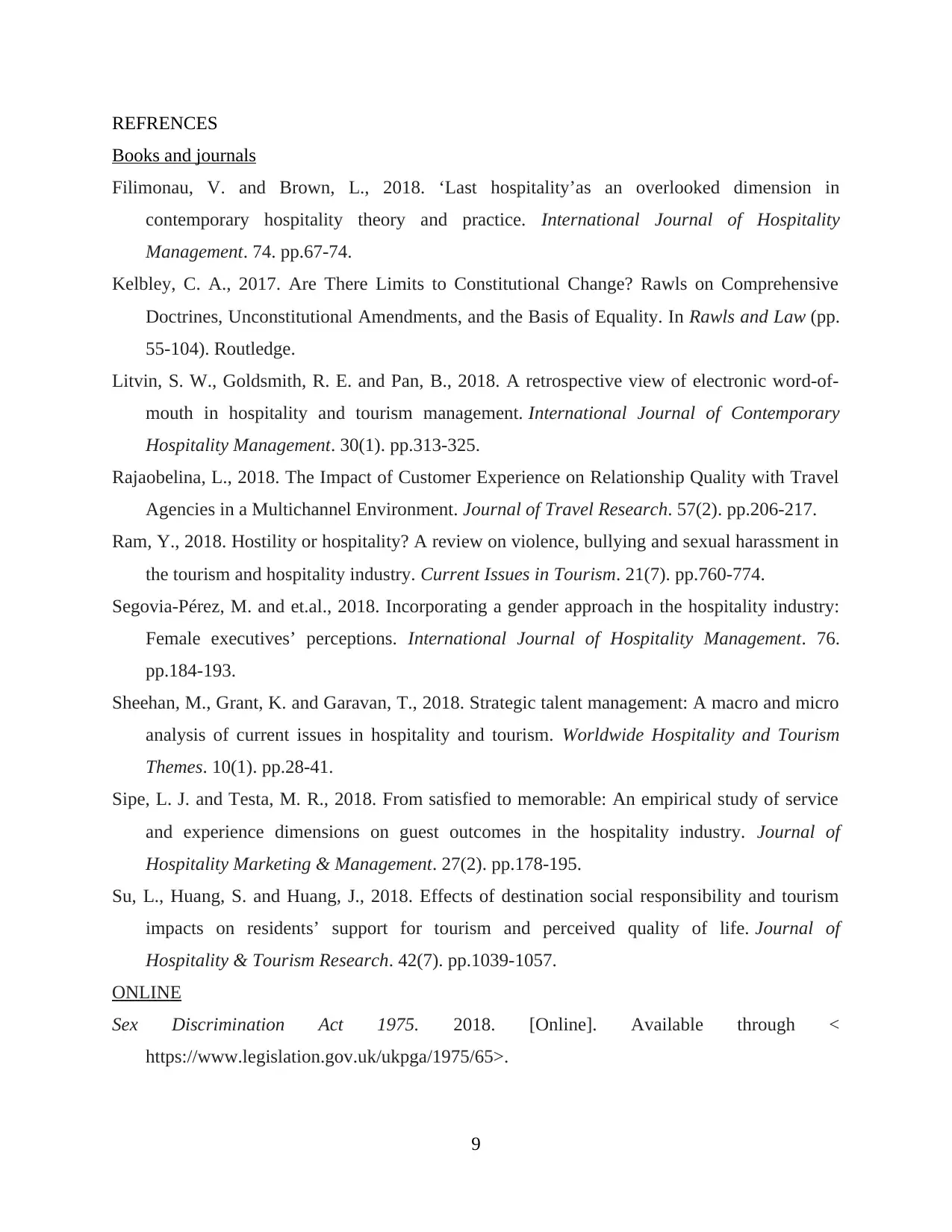
REFRENCES
Books and journals
Filimonau, V. and Brown, L., 2018. ‘Last hospitality’as an overlooked dimension in
contemporary hospitality theory and practice. International Journal of Hospitality
Management. 74. pp.67-74.
Kelbley, C. A., 2017. Are There Limits to Constitutional Change? Rawls on Comprehensive
Doctrines, Unconstitutional Amendments, and the Basis of Equality. In Rawls and Law (pp.
55-104). Routledge.
Litvin, S. W., Goldsmith, R. E. and Pan, B., 2018. A retrospective view of electronic word-of-
mouth in hospitality and tourism management. International Journal of Contemporary
Hospitality Management. 30(1). pp.313-325.
Rajaobelina, L., 2018. The Impact of Customer Experience on Relationship Quality with Travel
Agencies in a Multichannel Environment. Journal of Travel Research. 57(2). pp.206-217.
Ram, Y., 2018. Hostility or hospitality? A review on violence, bullying and sexual harassment in
the tourism and hospitality industry. Current Issues in Tourism. 21(7). pp.760-774.
Segovia-Pérez, M. and et.al., 2018. Incorporating a gender approach in the hospitality industry:
Female executives’ perceptions. International Journal of Hospitality Management. 76.
pp.184-193.
Sheehan, M., Grant, K. and Garavan, T., 2018. Strategic talent management: A macro and micro
analysis of current issues in hospitality and tourism. Worldwide Hospitality and Tourism
Themes. 10(1). pp.28-41.
Sipe, L. J. and Testa, M. R., 2018. From satisfied to memorable: An empirical study of service
and experience dimensions on guest outcomes in the hospitality industry. Journal of
Hospitality Marketing & Management. 27(2). pp.178-195.
Su, L., Huang, S. and Huang, J., 2018. Effects of destination social responsibility and tourism
impacts on residents’ support for tourism and perceived quality of life. Journal of
Hospitality & Tourism Research. 42(7). pp.1039-1057.
ONLINE
Sex Discrimination Act 1975. 2018. [Online]. Available through <
https://www.legislation.gov.uk/ukpga/1975/65>.
9
Books and journals
Filimonau, V. and Brown, L., 2018. ‘Last hospitality’as an overlooked dimension in
contemporary hospitality theory and practice. International Journal of Hospitality
Management. 74. pp.67-74.
Kelbley, C. A., 2017. Are There Limits to Constitutional Change? Rawls on Comprehensive
Doctrines, Unconstitutional Amendments, and the Basis of Equality. In Rawls and Law (pp.
55-104). Routledge.
Litvin, S. W., Goldsmith, R. E. and Pan, B., 2018. A retrospective view of electronic word-of-
mouth in hospitality and tourism management. International Journal of Contemporary
Hospitality Management. 30(1). pp.313-325.
Rajaobelina, L., 2018. The Impact of Customer Experience on Relationship Quality with Travel
Agencies in a Multichannel Environment. Journal of Travel Research. 57(2). pp.206-217.
Ram, Y., 2018. Hostility or hospitality? A review on violence, bullying and sexual harassment in
the tourism and hospitality industry. Current Issues in Tourism. 21(7). pp.760-774.
Segovia-Pérez, M. and et.al., 2018. Incorporating a gender approach in the hospitality industry:
Female executives’ perceptions. International Journal of Hospitality Management. 76.
pp.184-193.
Sheehan, M., Grant, K. and Garavan, T., 2018. Strategic talent management: A macro and micro
analysis of current issues in hospitality and tourism. Worldwide Hospitality and Tourism
Themes. 10(1). pp.28-41.
Sipe, L. J. and Testa, M. R., 2018. From satisfied to memorable: An empirical study of service
and experience dimensions on guest outcomes in the hospitality industry. Journal of
Hospitality Marketing & Management. 27(2). pp.178-195.
Su, L., Huang, S. and Huang, J., 2018. Effects of destination social responsibility and tourism
impacts on residents’ support for tourism and perceived quality of life. Journal of
Hospitality & Tourism Research. 42(7). pp.1039-1057.
ONLINE
Sex Discrimination Act 1975. 2018. [Online]. Available through <
https://www.legislation.gov.uk/ukpga/1975/65>.
9

10
⊘ This is a preview!⊘
Do you want full access?
Subscribe today to unlock all pages.

Trusted by 1+ million students worldwide
1 out of 12
Related Documents
Your All-in-One AI-Powered Toolkit for Academic Success.
+13062052269
info@desklib.com
Available 24*7 on WhatsApp / Email
![[object Object]](/_next/static/media/star-bottom.7253800d.svg)
Unlock your academic potential
Copyright © 2020–2026 A2Z Services. All Rights Reserved. Developed and managed by ZUCOL.


